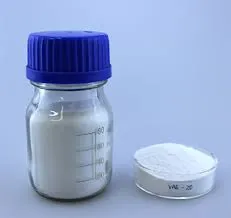
dec . 04, 2024 18:07 Back to list
redispersible polymer powder
Redispersible Polymer Powder The Versatile Binder for Modern Construction
Redispersible polymer powders (RDPs) have emerged as a vital component in modern construction materials, enhancing their performance and application range. This fine white powder, typically made by spray-drying a water-based polymer dispersion, has several attributes that make it a sought-after additive in various industries such as construction, adhesives, and coatings.
Understanding Redispersible Polymer Powder
To comprehend the significance of RDPs, it is essential to know their composition and properties. RDPs are generally based on polymers like ethylene-vinyl acetate (EVA), styrene-acrylic copolymers, or vinyl acetate. When mixed with water, they rehydrate to form a viscous paste. This paste can then be incorporated into various formulations, such as dry mortars, tile adhesives, and external wall insulation systems, providing enhanced adhesion, flexibility, and waterproofing.
One of the unique features of RDPs is their ability to improve the mechanical properties of construction materials. They contribute to tensile strength, crack resistance, and overall durability, making them indispensable in high-performance applications.
Applications in Construction
The versatility of redispersible polymer powders allows them to be utilized in diverse construction applications. For instance, in tile adhesives, RDPs enhance the adhesion to various substrates, enabling effective binding of tiles even in challenging conditions. They also improve the open time – the time a clamped adhesive remains workable – allowing for more flexibility during installation.
In exterior insulation and finish systems (EIFS), RDPs provide not only adhesion but also crucial weather resistance. They help in reducing water permeability, ensuring that the insulation material stays dry and functional, ultimately contributing to energy efficiency in buildings.
Another critical application is in self-leveling compounds. RDPs facilitate improved flow and leveling properties, ensuring that substrates are smooth and even after application. This is particularly important in flooring systems, where any imperfections can lead to costly repairs and maintenance in the future.
redispersible polymer powder

Advantages of Using RDPs
One of the most compelling reasons for the increasing popularity of redispersible polymer powders is their numerous advantages. First and foremost, they enhance adhesion properties, allowing construction materials to bond better with different substrates. Additionally, RDPs offer improved flexibility, reducing the likelihood of cracking under stress or load changes.
Moreover, RDPs provide excellent weather resistance, securing the longevity and durability of construction materials. They also contribute to the reduction of dust and improve the workability of dry mixes, allowing for easier application processes on-site. Furthermore, their incorporation can enhance the thermal and acoustic performance of buildings, thereby contributing to sustainability and comfort.
Sustainability and RDPs
As sustainability becomes a leading concern in the construction industry, RDPs contribute positively by allowing for the reduction of volatile organic compounds (VOCs) in construction materials. Many traditional adhesives and binders release harmful chemicals into the environment during application and curing. In contrast, RDPs are formulated to minimize VOC emissions, aligning with global efforts towards greener building practices.
Additionally, by improving the durability and performance of construction materials, RDPs facilitate the creation of longer-lasting structures, thus minimizing resource consumption and waste generated from repairs or replacements.
Conclusion
Redispersible polymer powders are more than just additives; they are transformative agents that redefine the capabilities of construction materials. With their ability to enhance adhesion, flexibility, weather resistance, and overall performance, RDPs are indispensable in modern construction. Their role in promoting sustainability within the industry is also increasingly vital as the world moves towards greater environmental responsibility.
As innovation continues to drive the construction sector, the continued development and application of redispersible polymer powders will undoubtedly play a crucial role in shaping the future of building materials and techniques. Whether it’s in high-rise buildings, residential complexes, or specialized applications, RDPs will ensure that structures are not only functional but also sustainable and durable for generations to come.
-
tile-bonding-additives-for-stronger-bonds
NewsAug.22,2025
-
construction-grade-rdp-for-wholesale-needs
NewsAug.22,2025
-
trusted-wholesale-hec-partners
NewsAug.22,2025
-
hec-solutions-for-industrial-excellence
NewsAug.22,2025
-
construction-additives-need-hpmc-essentials
NewsAug.22,2025
-
hpmc-versatile-cellulose-ether-for-industries
NewsAug.22,2025







